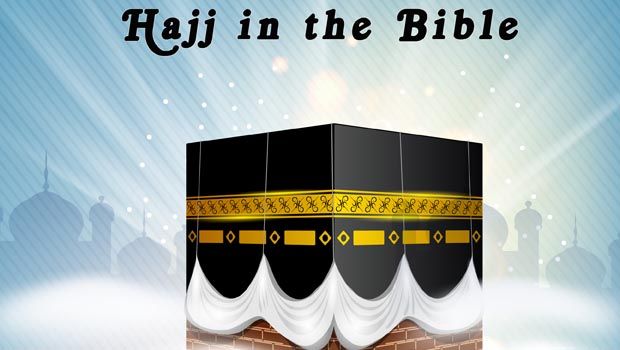When many Jews and Christians view Islam from the outside, they find parallels to their own faiths that usually inspire a great deal of curiosity. These parallels are often doctrinal, sometimes regarding the biographies of Prophets shared between the three Abrahamic faiths like Moses and Jesus (peace be upon them). Yet, sometimes striking parallels are found by the more discerning eye. Deep inquests often reveal textual and lexical similarities that are difficult, if not impossible, to explain by mere theories of one tradition borrowing from another.
The book of Exodus contains the following verse in reference to a Hajj in the time of Moses: “And this day shall be unto you for a memorial; and ye shall keep it a feast to the LORD throughout your generations; ye shall keep it a feast by an ordinance forever” (Exodus 12:14).
As millions upon millions of Muslim devotees engage in the rites of the Hajj pilgrimage, one of the five pillars of Islam, we can peer into the terms used in this age-old practice that lead us to a time long before the Prophet Muhammad (pbuh) was even born. Let us look at the word al-Hajj itself. Typically, the entire Arabic vocabulary, like its sisters in the Semitic linguistic group, consists of words structured from trilateral tri-consonantal roots. In this case the root is hajaj. According to the classical Arabic lexicon Lisan al-Arab it is defined as follows: “Purpose. As in, ‘So-and-so did hajj unto us,’ which means he presented himself before us.”
So the general lexical meaning of the word is “intended purpose.” In the context of the Hajj, the Ka`bah within the Meccan Sanctuary is the intended destination and purpose. To list usages of this word in an Islamic context would be, for most Muslims, an appeal to the very obvious as stories of its wonder and splendor that have been related to them since childhood. However, if we peer beyond the context of Islamic rites and deep into the past, do we find this word used in the previous traditions of the Old Testament? The answer is in the affirmative. The book of Exodus contains the following verse in reference to a Hajj in the time of Moses: “And this day shall be unto you for a memorial; and ye shall keep it a feast to the LORD throughout your generations; ye shall keep it a feast by an ordinance forever” (Exodus 12:14).
In this verse, the King James translators rendered the uninflected noun Khag as “feast.” This word Khag is wholly cognate to the Arabic Hajj. Elsewhere in the verse the word Khag is inflected as khagotem and takhaguhu. One must pay attention to the fact that the Hebrew phonetic “kh” is the pharyngeal fricative “h” in Arabic. Also, one must note that the phonetic “g” is cognate to the Arabic “j.” So for analytical purposes in this context the verse would be rendered: “And this day shall be unto you for a memorial; and ye shall keep it a Hajj to the LORD throughout your generations; ye shall keep it a Hajj by an ordinance forever.” Another verse using this root is the following: “And afterward Moses and Aaron went in, and told Pharaoh, ‘Thus saith the LORD God of Israel, Let my people go that they may hold a feast unto me in the wilderness” (Exodus 5:1).
“This Qur’an could not have been authored by any other than God, as it rectifies what came before it and elucidates what was in the previous scriptures. Let there be no doubt that this is, indeed, from the Lord of all Worlds” (Qur’an 10:37).
The inflected word that the King James translators rendered “feast” is yakhugg? which is cognate to the Arabic “yuhajju,” so for analytical purposes the verse would be rendered in this context as: “And afterward Moses and Aaron went in, and told Pharaoh, Thus saith the LORD God of Israel, Let my people go, that they may hold a Hajj unto me in the wilderness.” This is not to suggest that Moses and Aaron went to Mecca and performed Hajj as Muslims know it today. It is merely to exemplify that a consecrated journey and pilgrimage unto God at His Temple did, indeed, precede the rise of Islam in the 7th Century CE. An additional and astonishing dimension to this that makes the concept of lexical borrowing between the Old Testament and the Qur’an improbable, if not outright impossible, is found in an alternate form of the root in Hebrew, Khug. Friedrich Wilhelm Gesenius (1846) defines this word: “To describe a circle, to draw a circle, as with compasses. Job 26:10…m. a circle, sphere, used of the arch or vault of the sky, Pro. 8:27; Job 22:14; of the world, Isa. 40:22.” Let us look at the verses he has cited:
“When he prepared the heavens, I was there: when he set a compass upon the face of the depth” (Proverbs 8:27).
“Thick clouds are a covering to him, that he seeth not; and he walketh in the circuit of heaven” (Job 22:14).
“It is he that sitteth upon the circle of the earth, and the inhabitants thereof are as grasshoppers; that stretcheth out the heavens as a curtain, and spreadeth them out as a tent to dwell in” (Isaiah 40:22).
Thus, this word not only means sacred pilgrimage and feast unto God in the Bible, it also means to encircle. To any Muslim this will be a striking discovery.
Semitic languages have been, since time immemorial, broad and deep systems of expression where one word’s many variant, but supplementary, meanings all coalesce to a greater understanding of that lexeme. So in this case we have a root which has a form meaning a feast, also meaning a pilgrimage, and in one form meaning to encircle! The Hajj pilgrimage, which is at its core an encircling of the Ka`bah, called Tawaf, is concluded with none other than the Feast of the Sacrifice, Eid al-Adha, to commemorate Abraham’s willingness to sacrifice his son at God’s command. Borrowing all these meanings buried in lexica that did not even exist until hundreds of years after the life of the Prophet Muhammad (pbuh) would require nothing short of a Semitic linguist and Biblical scholar. It should be noted that the Bible itself would not be available until 200-300 years after the passing of the Prophet Muhammad (The International Standard Bible Encyclopedia, vol. 4, Geoffrey W. Bromiley, p. 982). Such lexical depth and lucidity is consistently found throughout the Qur’an as God has stated therein:
“This Qur’an could not have been authored by any other than God, as it rectifies what came before it and elucidates what was in the previous scriptures. Let there be no doubt that this is, indeed, from the Lord of all Worlds” (Qur’an 10:37).
—–Shibli Zaman—-
Did Jesus (pbuh) personally claim divinity?
The response to this question could be found in the following Qur’anic verses: “At length she brought the (babe) to her people, carrying him (in her arms). They said: ‘O Mary! Truly an amazing thing hast thou brought! O sister of Aaron! Thy father was not a man of evil, nor thy mother a woman unchaste!’ But she pointed to the babe. They said: ‘How can we talk to one who is a child in the cradle?’ He said: ‘I am indeed a servant of Allah. He hath given me revelation and made me a prophet; And He hath made me blessed wherever I be, and hath enjoined on me Prayer and Charity as long as I live; (He) hath made me kind to my mother, and not overbearing or miserable; So peace is on me the day I was born, the day that I die, and the day that I shall be raised up to life (again)!’ Such (was) Jesus the son of Mary: (it is) a statement of truth, about which they (vainly) dispute. It is not befitting to (the majesty of) Allah that He should beget a son. Glory be to Him! When He determines a matter, He only says to it, ‘be’, and it is. Verily Allah is my Lord and your Lord; therefore serve Him: this is a Way that is straight. But the sects differ among themselves: and woe to the unbelievers because of the (coming) Judgment of a Momentous Day! How plainly will they see and hear, the Day that they will appear before Us! But the unjust today are in error manifest! Warn them of the Day of Distress, when the matter will be determined: for (behold,) they are negligent and they do not believe! It is We Who will inherit the earth, and all beings thereon; to Us will they all be returned” (19:27-40).
Actually, the Quranic verses cited above point out that Jesus, himself, proclaimed his humanity and that he was a servant of Allah and a prophet, clearly not divine. He actually rebuked the people who would develop those philosophical ideas after he is gone. An example is when Satan came to Prophet Jesus and tried to tempt him as it appears in the book of Matthew (4:1-11). Now the question is how can Satan tempt God? This is only conceivable if the person who is subjected to temptation is a human being and that is what Jesus spoke of. Also, on many occasions Jesus had gone to the wilderness or mountains to pray. Now what does it mean that Jesus is praying? He is praying to someone who is greater than himself. He is praying to his God and Lord, and in accordance to the definition of the Trinity this doesn’t make sense. Nobody prays to himself; so why would Jesus pray to himself if he was God?
In the book of Matthew, Jesus denies any knowledge of the unseen or the last hour (24:36). Again the knowledge of the unseen is definitely one of the divine attributes and if somebody doesn’t know the future then he is not God – he is a human being. He may be pious, he may be a messenger, but he is not God. Additionally, the Gospel of Mark says that when someone ran after Jesus and said ‘Good Master’ Jesus would reply, “Why do you call me good? No one is good—except God alone” (10:17-18). Here this doesn’t mean that Jesus is not good but that goodness, in the absolute sense, is a divine attribute and that is not to be used as a description of him. In the Gospel of John, Jesus admits and says that “father is greater than I” (14:28), which is very clear evidence he never meant that he is divine and even denied it and clarified that he is simply a human and messenger of God. That is exactly what the Qur’an, 600 years later, confirms.






